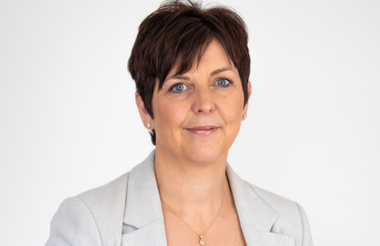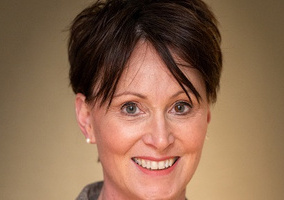Laura-Jane Rawlings is not your average not-for-profit sector CEO. At 16, she left school after “not achieving GCSEs” and never feeling connected to the educational system.
She was also bullied during secondary school for being a “tomboy” and facing financial challenges at home.
“I never had the cool shoes and clothes. I never fit in, in terms of some of those groups that exist, so spent quite a bit of time just removing myself from group situations and things like that at school. I didn’t have the best experience,” Rawlings says.
Experiencing poverty
Rawlings grew up in a loving home that faced periods of poverty. From a young age, she remembers the challenge of her mother balancing money at home.
“I have a stark image in my head of my mum and dad not eating one evening because there was only enough food for my sister and I, and that would have been a beans-on-toast type of meal.
“Money was a real struggle for us as a family and the biggest barrier we had. But what they lacked in money, my parents were always able to make up for in love and support. There was an abundance of that and that makes a difference.”
Because of the financial challenges they faced, Rawlings and her family had to move house a lot during her primary and secondary school education. She attended three different primary and junior schools, which she says had an impact on her skill acquisition and education attainment.
In addition, her parents were not “particularly academic”, meaning she did not have much support to develop her academic skills.
“I’ve thought about all of that over the last few years in terms of why my experience is different from others and why it’s led me to be the type of person I am and start Youth Employment UK,” she says.
As a teenager, it was crucial for Rawlings to get an accessible part-time job so that she could buy items for herself. When she turned 13, she got a paper round job and started waitressing at 14 or 15, which allowed her to develop skills in dealing with the general public.
“It was a different skill development during my time in secondary school because the work stuff was easier, more fun and had a fundamental result. Every shift, I was making money whereas in school I was a grey student – the ones that aren’t causing problems or gifted and talented.”
Rawlings believes that as a “middle student”, she was perfectly capable of achieving GCSEs but the lack of focus on her and work needed to secure the grades, prevented her from doing so.
“Schools are very different now. My daughter who’s doing GCSEs this year is in after-school sessions four days a week and lunchtime clubs for revision.
“There was none of that pressure for some schools that there is now and it was easy for grey students to come, go and disappear.”
Tackling the education and employment gap
By the age of 16, Rawlings says she had the necessary skills to navigate the world of work. After working in retail, she built a career in sales and marketing and then recruitment.
While working in recruitment, she noticed that young people were struggling to transition from school to work and lacked confidence in their skills.
She says: “That got me curious because when I left school, I was ready. I became aware of this gap between education and employment and started volunteering in schools because I wanted to help young people understand that game.”
In 2012, with youth unemployment reaching 21%, Rawlings saw an opportunity to empower young people to be prepared for the world of work.
“That was the birth of Youth Employment UK because I was like: ‘Who’s advocating for young people and the services they need? Who’s making sure there’s a service that fits purpose and that young people with varied individual experiences are understood by the system?’
“In 2012, there was very little because of austerity and everything else that was going on. The youth voice and youth-led services weren’t strong across the country.”
Rawlings set up Youth Employment UK as an independent, not-for-profit community interest company (CIC), as it was an “easier option for somebody who didn’t have any experience”, she says.
“It’s fewer hurdles to jump to get something up and running so that’s why I went for it to be a not-for-profit CIC.”
Today, her organisation helps young people access the support and information they need to progress, gives them a voice on the issues that affect them and works with employers to develop and be recognised for their youth-friendly employment practice, among other things.
‘The charity sector isn’t particularly friendly’
Rawlings says that from what she has seen, “it’s really hard to become a leader in the charity sector”.
“I don’t think it’s particularly friendly. I really struggled to build networks with other chief executives. I now have done it but it’s taken sharp elbows and persistence and proven time and time again that there’s a need for Youth Employment UK to exist alongside them.
“As a young leader coming into the charity sector, I found it really hard, frustrating and lonely.”
She recalls being in rooms for the first time with not-for-profit chief executives and the first question everybody would ask was “who funds you?”.
“There’s this competition because of a defensiveness around funding. I remember sitting in a room at a Cabinet Office event very early on with all the charity leaders and they told the government that one of their biggest challenges was that they wouldn’t refer young people to other services because they’d lose the funding for that young person.
“I was struck by that because by its nature, the charity sector should be about doing the right thing for the right person, but it’s clear that funding drives behaviour in the sector.”
Rawlings believes that the sector is “quite narrowed by the leaders’ skills and experiences of only ever working in the third sector” who might not necessarily know how to pivot quickly.
“We’ve seen it over the last few years through austerity and the cost-of-living crisis. We start to see more and more charities struggling to keep the lights on and it’s a commercial acumen sometimes that isn’t there.”
‘It worries me when organisations like the British Youth Council close down’
Since its establishment, Youth Employment UK has supported millions of young people and worked with more than 900 employers.
Rawlings says she has the “most incredible team” who worked hard to build her organisation’s foundation.
“I’m optimistic for Youth Employment UK. We’re about to transform into a different league and many have been saying that we’re already punching above our weight for an organisation of our size and turnover. But I think we’re going to step up a gear over the next 12 months and that’s exciting.”
However, she admits that when she founded Youth Employment UK 12 years ago, she thought it would be “quite easy to solve” youth unemployment.
“I could see the parts of the puzzles that needed piecing together and felt there was a way to solve it. Now, in 2024, youth unemployment has become the most complex issue. If we go through any economic challenge, employers aren’t hiring and reduce their apprenticeship programme and training.
“Employers aren’t offering work experience because they’re hybrid, yet they’re demanding work experience from young people before they recruit them.”
The next few years are going to be “extremely hard” for young people and that is why Youth Employment UK is needed more than ever before, she says.
“I’m glad we’ve got our structure right to be able to stay in the fight. It worries me when we see organisations like the British Youth Council closing themselves down because we need more of us to advocate for young people and provide the support they need the most.”
Related articles












